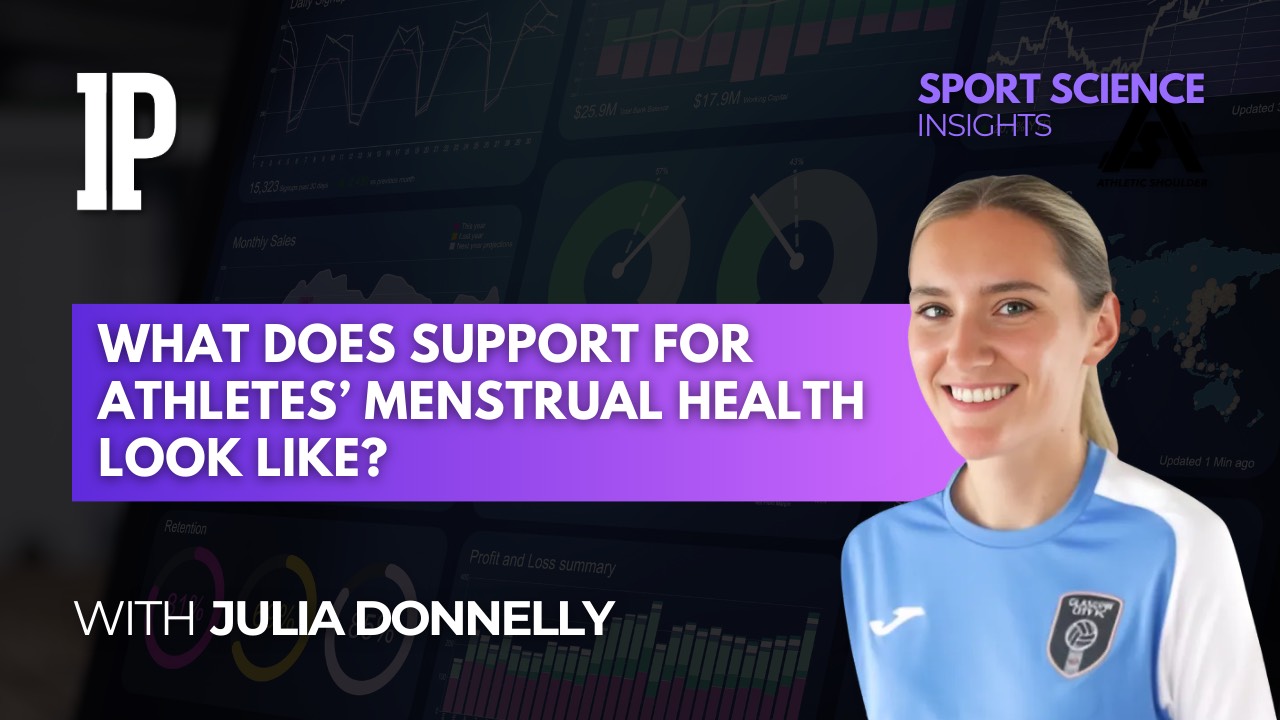Julia Donnelly: What Does Support for Athletes’ Menstrual Health Look Like?
Sep 08, 2025
Episode 195: In this episode of the Sports Science Insights Podcast, powered by Inform Performance and hosted by Steve Barrett, we’re joined by Julia Donnelly — Head of Performance at Athletes Focused, where she provides performance services across multiple sports and professional organisations.
Julia’s applied work includes supporting the Scottish Women’s National Team age groups, Glasgow City Women, and other elite athletes. She recently completed her PhD exploring the menstrual cycle in football, adding valuable research to an underrepresented but vital area of sports science.
Topics Discussed:
-
Julia’s background and applied performance work across sport
-
Her PhD research on menstrual health in female athletes
-
How growing knowledge in this area can shape better athlete support
-
Insights from her recent published papers
Key Points
-
The impact of the menstrual cycle on female athlete performance is highly individualized, and both communication and support structures must reflect this variability. Research indicates significant differences not just between individuals, but also in how athletes experience symptoms and understand their cycles, underscoring the necessity to prioritize tailored, athlete-centered support rather than protocol-driven approaches.
-
Cultural barriers and the taboo nature of menstrual health discussions remain significant in sport environments. These barriers frequently lead to poor communication between athletes and practitioners, which in turn limits support for athletes dealing with cycle-related symptoms. Establishing normalized, open dialogue around menstrual health is crucial to improving both support processes and athlete comfort within high-performance and development environments.
-
The effectiveness of coach education on menstrual cycle support is maximized when sessions are practical and collaborative, involving both coaches and athletes. Education should move beyond biological instruction, emphasizing skills that help practitioners initiate meaningful conversations, foster trust, and directly address athletes’ individual needs regarding cycle-related challenges while still embedding sufficient technical knowledge to guide practice safely.
-
Age significantly influences athletes’ perception of menstrual cycle impact and their likelihood to communicate openly about symptoms. Adolescent and pre-menarchal athletes often demonstrate lower rates of communication regarding menstrual health, and, despite reporting fewer experiences with negative symptoms, many still anticipate their cycle to negatively affect performance. Targeted education and supportive structures at earlier age groups are essential to break the cycle of taboo and facilitate healthier engagement as they mature.
-
Senior athletes, even when exposed to years of health education, still present with varied levels of knowledge and symptom awareness concerning their cycles. Some develop entrenched misconceptions that are resistant to change, and performance staff must adapt by focusing on symptom monitoring and individualized conversations rather than assuming broad knowledge or perfect self-management. Resources should be concentrated on those most visibly affected, while still ensuring open access for the wider group.
-
Stakeholder engagement and resource availability create a clear divide between elite programs and grassroots environments regarding menstrual cycle support. Top-level teams benefit from multidisciplinary medical teams and advanced monitoring tools, enabling rapid and bespoke interventions. In contrast, grassroots and resource-limited environments may be overwhelmed by perceived expectations and should focus on achieving smaller “quick wins” — such as relationship-building and establishing clear support routes — as foundations for longer-term progress.
-
Monitoring and wellness tracking related to the menstrual cycle must always be voluntary and supported by clear protocols for athlete privacy and care. Obligatory disclosure without sufficient psychological safety, explanation, or referral pathways risks harming trust and may discourage athlete engagement. Performance teams should ensure that monitoring initiatives are seen as optional, well-explained, and always geared toward better individualized support.
-
Education for coaches and practitioners should not only provide knowledge but also furnish processes and practical tools for responding when athletes disclose menstrual health concerns. This includes developing referral pathways, establishing multidisciplinary support systems (involving medical, physiotherapy, and psychological input), and ensuring procedures are embedded in club structures. Effective support cannot exist if practitioners are unprepared to act appropriately when issues are raised.
-
Bespoke education and support models, carefully contextualized to the specific sport and even to individual organizations, are more effective than “copy-paste” or generic approaches. Team-based sports can leverage peer discussion to reduce stigma and improve awareness, while individual sports may present unique challenges requiring sensitive, differentiated strategies. Performance staff should collaborate with athletes to ensure relevance, effectiveness, and long-term buy-in.
-
Ongoing research and evolving practice in this space should focus both on refining education models and on longitudinally assessing the actual impact of interventions across different age groups and sports. Early evidence suggests that building menstrual health literacy at youth levels delivers benefits in terms of athlete understanding and communication as they progress into elite environments, but continuous adaptation, feedback, and stakeholder involvement are necessary to embed these gains sustainably.
Where you can find Julia:
• LinkedIn
• ResearchGate
• X
Julia’s Papers:
🔗 Menstrual cycle perceptions in professional football
🔗 Menstrual health support in elite women’s sport
Sponsors
VALD Performance, makers of the Nordbord, Forceframe, ForeDecks and HumanTrak. VALD Performance systems are built with the high-performance practitioner in mind, translating traditionally lab-based technologies into engaging, quick, easy-to-use tools for daily testing, monitoring and training
Hytro: The world’s leading Blood Flow Restriction (BFR) wearable, designed to accelerate recovery and maximise athletic potential using Hytro BFR for Professional Sport.




